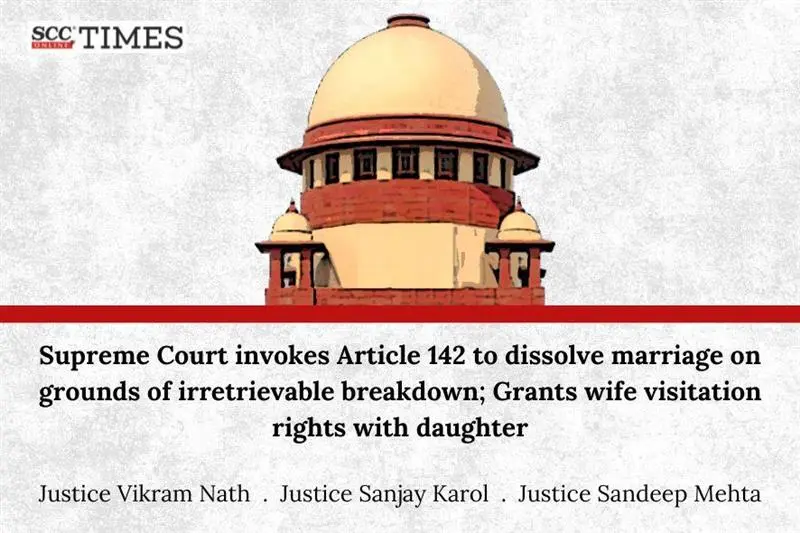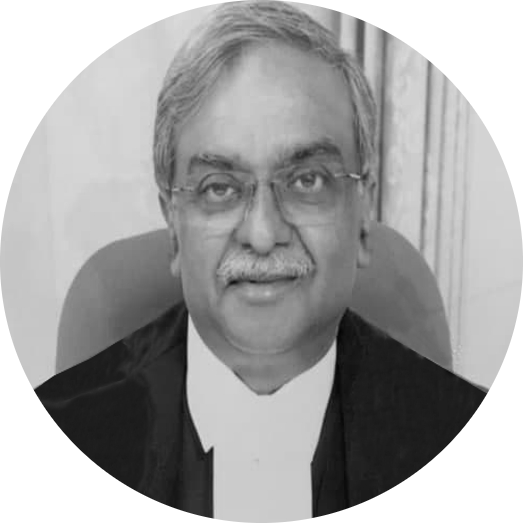Supreme Court: In an appeal filed against the judgment of the Jharkhand High Court, which had upheld the Family Court’s decision for dissolution of marriage under Sections 13(1)(ia) and 13(1)(iii) of the Hindu Marriage Act, 1955, a Three-Judge Bench comprising Vikram Nath*, Sanjay Karol, and Sandeep Mehta, JJ., held that the marriage between the parties had completely and irrevocably broken down. The Court noted that multiple attempts at reconciliation through mediation had failed and that neither party had demonstrated any willingness or inclination to restore the marital relationship. The parties had lived separately for over a decade, with no existing marital ties. In its considered view, continuation of such a marriage would have only perpetuated hardship and served no meaningful purpose.
Invoking its powers under Article 142 of the Constitution of India to do complete justice, the Court found this to be a fit case for dissolving the marriage on the ground of irretrievable breakdown. Accordingly, it directed that the wife would be entitled to visitation rights with her daughter on two days each month.
Background
The marriage between the parties had been solemnized on 24-11-2012. Two children were born out of the said wedlock. The first child, a daughter, was born on 17-08-2013. Thereafter, on 06-03-2014, the husband had instituted a petition under Sections 13(1)(ia) and (iii) of the Hindu Marriage Act, 1955, before the Family Court, seeking a decree of divorce. At the time of filing the petition, the wife was pregnant with their second child. Subsequently, the wife had filed a Complaint Case, alleging mental and physical cruelty against the husband and his parents, invoking provisions of Section 498-A of the Penal Code, 1860, (‘IPC’) and Sections 3 and 4 of the Dowry Prohibition Act, 1961. On 30-11-2014, the wife gave birth to their second child, who was diagnosed with cerebral palsy. In the divorce proceedings, the husband had alleged that the wife had subjected him and his family to verbal abuse amounting to cruelty. These allegations were denied by the wife, who, in turn, had alleged mental and physical cruelty inflicted upon her by the husband. Upon hearing both parties, the Family Court, vide its order dated 02-07-2019, had dismissed the husband’s petition for divorce. Aggrieved by the decision, the husband preferred an appeal before the High Court. The High Court, by its impugned judgment dismissed the appeal, holding, inter alia, that since the parties had cohabited until March 2014, the allegations of cruelty made prior thereto could not be sustained, particularly in view of the fact that the second child had been born on 30-11-2014. Aggrieved by the concurrent findings of both Courts below, the husband approached this Court.
Submissions
The husband had now sought dissolution of marriage on the ground of irretrievable breakdown. It was submitted that the parties had been living separately for over eleven years and that the relationship had been irreparably damaged by prolonged hostility, deep-seated bitterness, and mutual allegations of a grave and serious nature. The marriage, it was contended, had reached a point of no return, with no possibility of reconciliation or revival. The husband submitted that the elder daughter, presently aged about 12 years, had been in his exclusive care and custody since infancy. She had been residing with him since the age of six months, and all expenses relating to her education and upbringing had been borne solely by him.
On the other hand, the wife stated that the second child, born in November 2014 and diagnosed with cerebral palsy, had remained under her sole care from birth. Unfortunately, the said child had passed away after a few years. The wife submitted that she had single-handedly provided care and support for the special needs of the second child during that period.
The husband further submitted that, despite the prolonged separation of more than a decade, the wife had never approached any court seeking custody or visitation rights concerning the elder daughter. He thus asserted that the custody of the child had lawfully and practically remained with him. Nonetheless, he expressed that he had no objection if reasonable visitation rights were granted to the wife at his residence.
Analysis and Decision
The Court noted that, from the factual matrix before it, it was evident that the marriage had completely and irrevocably broken down. Multiple attempts at reconciliation through mediation had failed. Neither party had shown any willingness or inclination to restore the marital bond. The parties had lived separate lives for over a decade, and there was a complete absence of marital ties. In the Court’s considered view, continuing such a marriage would only have perpetuated hardship and served no useful purpose. It held that this was a fit case for the exercise of its jurisdiction under Article 142 of the Constitution of India to do complete justice by dissolving the marriage on the ground of irretrievable breakdown.
The Court further noted that, although the wife had neither filed nor pursued any formal petition for custody or visitation of the elder daughter, she ought not to have been deprived of access to her child. It held that depriving the mother of all contact would not only cause her emotional harm but could also adversely affect the welfare of the child. In the interest of justice, equity, and the child’s welfare, the Court deemed it appropriate to grant visitation rights to the wife so that she might gradually rebuild a bond with her daughter. It further observed that such an arrangement would allow the child to benefit from the love, affection, and guidance of her mother.
Accordingly, the Court directed that the wife would be entitled to visitation rights with her daughter for two days each month. The parties were to mutually fix convenient dates each month, on which the wife might visit the child at the husband’s residence and spend quality time with her. The parties were directed to cooperate in good faith and ensure the smooth implementation of this arrangement. All reasonable expenses incurred in facilitating these visits were to be borne by the husband. It was clarified that this arrangement did not amount to a determination of custody, and both parties would remain at liberty to approach the appropriate forum for adjudication of custody rights, should they so desire.
In light of the foregoing discussion, the Court concluded that the appeal stood allowed. The marriage between the parties stood dissolved under Article 142 of the Constitution of India on the ground of irretrievable breakdown of marriage. The wife was held entitled to visitation in the terms set forth above.
CASE DETAILS
|
Citation: Appellants : Respondents : |
Advocates who appeared in this case For Petitioner(s): For Respondent(s): |
CORAM :











